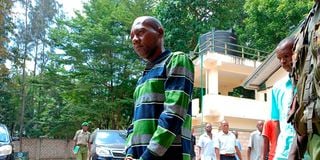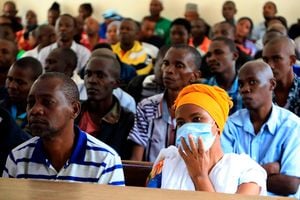
Controversial Preacher Paul Mackenzie.
A witness in the Shakahola massacre trial has told a Mombasa Court his food business was thriving until followers of Kilifi cult leader Paul Makenzie started fasting.
Shadrack Baya Yaa, who had a cereal shop near Shakahola Youth Polytechnic, told the court he made good sales until followers of Mackenzie started mass fasting.
"Business was booming. I made substantial profits, expanded my operations, and even purchased a posho mill for the numerous customers flocking to my cereal shop near Shakahola Youth Polytechnic," Yaa, a farmer said.
He testified in a Mombasa Court during the trial against Mr Mackenzie and his 94 accomplices for the murder of over 429 members of the Good News International Church.
His business was thriving from 2021 until it plummeted in early March 2023. Unknown to him, his client base in the forest had received a new order. A complete fast had been declared in the forest, where most of his clients were coming from. This meant that there was no need for food.
However, it took him time to discover this.
His testimony before Chief Magistrate Alex Ithuku was crucial in helping the court determine how Mackenzie acquired over 10 acres of land in the forest, where the doomsday preacher eventually relocated to conduct his religious activities that would years later prove fatal.
He began by detailing the circumstances under which his Mwabaya Mwaro Clan asserts ownership of the Shakahola land, a portion of which Mackenzie acquired, where his followers are said to have starved to death and were buried in mass graves.
He is a member of the clan, a family that traces its origins to the present Kaloleni Sub-county over a century ago.
“This is according to our family's history, which has been passed down to us by our elders through the generations,” he stated, while being guided by State Counsel Yassir Mohamed.
The clan consisted of four brothers: Baya, Mangi, Jefa, and Mure Ndungo, who first moved to the Kafulani area in Ganze Sub-County, where they settled for some time, during which Mangi died while still a bachelor.
While Jefa relocated to the Langobaya area within Malindi, where he settled, Baya and Mure continued with their families to the present Shakahola area, which was then inhabited by members of the Wa Wata Tribe.
The two brothers were welcomed there by the Baganda/Bajila family after paying an agreed “Kajama.” "Kajama" is a token of appreciation given to someone, who allows you to settle among them or, who voluntarily offers you any favor within the Mijikenda community.
The Wa Wata tribe were pastoralists. “After offering our great-grandfathers a portion of their land, a sheep (referred to as "Hola" in the Wa Wata tribe) was slaughtered along a stream known as "Shaka" to mark the mutual agreement, hence the origin of the name "Shakahola," the witness explained.
He stated that no member of his Mwabaya Mwaro clan possesses title documents for the Shakahola land, including the portion given to Mackenzie by some of his clan members through "Kajama."
“But we are asserting our claim of ownership by it being our ancestral land, as I have already explained here,” the witness said.
He is, however, not privy to the specific details or circumstances under which Mackenzie acquired the parcel of land where he is reported to have settled with his followers, but he clarified that his father’s cousin was involved in Mackenzie’s acquisition of the land in question.
“Mackenzie and his followers had already settled in that parcel, which had initially been fraudulently sold to them by some members of the Wa Wata Tribe at the time of their agreement,” he said.
In 2020, his casual employee informed him that someone had inquired about the possibility of acquiring 10 acres of land by the roadside.
A week later, he realised the man was Mackenzie, who had at that time settled with his followers in the forest.
“I mutually agreed with Mackenzie on a Kajama of Sh5,000 per acre for my ten acres by the roadside. He asked for my national identity card details to enable him to draft the sale agreement for my signing the next day in Malindi,” said Mr Yaa.
The next day, he proceeded to Mackenzie’s church branch in Furunzi. “Mackenzie brought the typed sale agreement, which I signed, and he gave me Sh50,000 in cash. However, he did not provide me with a copy of the agreement due to a power outage and thus undertook to give it to me later,” he said.
Mackenzie has yet to provide him with the document. That is how Mackenzie acquired the witness’s land.
With Mackenzie and his followers now settled in the forest by 2021, Mr Yaa started experiencing a windfall in his business.
He began selling maize in his cereal shop to meet the demands of his new customers.
“I used to receive a lot of customers from Mackenzie's Shakahola forest land to the extent that they purchased my entire maize harvest. I had to purchase more from Malindi town to resell to them at a profit. I was personally present in the shop on weekends, but on the other days, I would have an assistant standing in,” he said.
He even made sure there was a Posho Mill to help his customers return to the forest with flour and maize. But how did he know they were from Kwa Mackenzie in the forest?
In his testimony, Mr Yaa stated he was born and raised in the area, so he was very familiar with all the locals, including those who had acquired land by the roadside.
“The women wore long dresses or skirts, dressed decently, and did not braid their hair, making them distinct from most of the other women in our village,” he said.
The witness mentioned that during all the dry seasons from January 2022 to early March 2023 or thereabouts, he could frequently see many people from Shakahola forest Kwa Mackenzie either on foot, using bicycles, or riding motorbikes going to the river (Shakahola Bridge) to fetch water.
He noted that such movements commenced between 4:00 a.m. and 4:30 a.m. and continued until very late in the evening.
“I knew that these people were from Mackenzie's land due to the women's dress code, coupled with the fact that the locals typically fetched piped water in Shakahola center, unlike this group which went for free water at Shakahola mtoni (river),” he said.
However, towards the end of January 2023, the witness observed that customers from Shakahola Kwa Mackenzie were no longer visiting his shop to buy cereals or frequenting 'Shakahola mtoni' to fetch water as they had before.
“I presumed that these individuals might have returned to their original homes due to the extremely dry and hot January weather in the area,” he said.
In early March 2023, a protected witness in the case, HG, visited Mr Yaa at his Posho Mill with a complaint. He had previously met HG in the company of Mackenzie. They had met at the home of a woman whom Mackenzie wanted to evict.
“But I amicably resolved the issue after establishing that the woman had some grievances, including that some of her goats were being forcefully taken away by Mackenzie’s followers,” he said.
The witness stated that HG disclosed to him at the time that he had stopped living in Shakahola Kwa Mackenzie's forest and relocated to Malindi town with his family due to the strict conditions in the wilderness, which included a demand that people should not engage in employment.
HG reported to this witness that he found his three acres of land, which he had purchased from Mackenzie at Sh2000 per acre, allocated to someone else, and his household goods taken to the doomsday preacher’s residence within the wilderness.
“As such, he needed my intervention to help him reclaim his land and household goods. I referred HG to the village elder Kenga Katana Chea,” he said when questioned by Mackenzie's lawyer, Lawrence Obonyo.
They agreed to meet Mackenzie and resolve this dispute. However, the witness traveled to Voi for some business errands.
A week later, Mr Yaa received a phone call from HG.
“He informed me that 14 children had died and were discovered buried in graves in the Shakahola Kwa Mackenzie area,” he said.
The witness mentioned that he shared this information with Inspector Caleb of the General Service Unit, Galana Camp, for immediate intervention.
Mr Yaa stated that he returned to Shakahola on April 23, and what followed was the exhumation of dead bodies and the rescue of emaciated followers of Mackenzie from the forest.
“I found a slightly older boy who was injured; he told us that he was hit from behind while reaching out to drink water to quench his thirst,” said Mr Yaa.
He and others were thereafter engaged in a search and rescue mission, as well as the identification of the graves marked with poles where they suspected followers of Mackenzie had been buried.
Those they found alive and able to talk disclosed to them that Mackenzie had instructed them to starve to death to meet Jesus.







